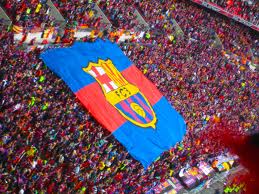By Mark Baber
March 8 – UNICEF have written to FC Barcelona following a report by insideworldfootball that Barcelona may have breached FIFA regulations on the transfer of young players from abroad.
Regulations that were designed by FIFA to prevent child trafficking. UNICEF spokesman Peter Smerdon said: “UNICEF takes seriously reports that FC Barcelona may have breached FIFA regulations on the international transfer of young players. We are in contact with FC Barcelona to clarify the club’s position and to fully understand the legal issue at hand.”
FIFA’s request that certain players at Barcelona’s academy, should not be played in the youth teams as there may have been a breach of regulations on the transfer of young players, has shone the spotlight on Barcelona’s youth policy. [http://www.insideworldfootball.com/world-football/europe/12077-barcelona-in-breach-of-fifa-child-trafficking-rules?highlight=WyJiYXJjZWxvbmEiLCJjaGlsZCIsInRyYWZmaWNraW5nIl0=]
Media reports indicate children at the Barcelona academy have a similar training regime to adults and spend up to two and a half hours training a day.
UNICEF has asked for clarification over “any implications for those children under the age of 18 who are on FC Barcelona’s books and have come from outside Spain.”
In 2009 it was reported by Reuters [http://uk.reuters.com/article/2009/05/25/soccer-champions-barcelona-youth-idUKLO72065620090525] that “since 1979 more than 440 youngsters have left their homes and families to live at the Masia, about half from Catalonia and the rest from Spain and beyond, including 15 from Cameroon, seven from Brazil, five from Senegal and three from Argentina. More than 40 have made it into Barca’s first team and almost as many have played for other sides in Spain’s top division.”
According to Smerdon: “UNICEF is guided by the Convention on the Rights of the Child and our priority is the protection of all children and their rights. Based on five years of partnership with FC Barcelona we acknowledge the club’s commitment to strive for excellence in the development and well-being of their players not only as athletes but also as individuals.”
Iniesta, one of the most famous products of the Barcelona youth system, who was taken away from his family when he was 12, told Barca TV in 2001: “I did not enjoy my first years at the club, I was very young and for much of the time I felt very lonely, but thanks to the support of my friends and coaches, I made it.” The experience of being separated from family, culture and language must be even more difficult for a 12 year old from a developing country.
However, UNICEF says: “We are not aware of allegations of child protection violations at La Masia that would require investigations. UNICEF does not have a monitoring role as that duty lies with the state and industry. But UNICEF was invited to visit La Masia in 2009 and found it to be a well-established training centre staffed by dedicated coaches and training staff.”
According to the UNICEF website, UNICEF Spain and FC Barcelona kicked off their first five-year partnership in September 2006 to raise awareness and funds to benefit children affected by HIV and AIDS. Every year for five years, the club donated €1.5 million to help fund projects aimed at combating HIV and AIDS in Africa and Latin America. The agreement was renewed in 2011 for a further 5 years, with the UNICEF logo going on the back of the FC Barcelona shirt.
Contact the writer of this story at moc.l1744644653labto1744644653ofdlr1744644653owedi1744644653sni@r1744644653ebab.1744644653kram1744644653

